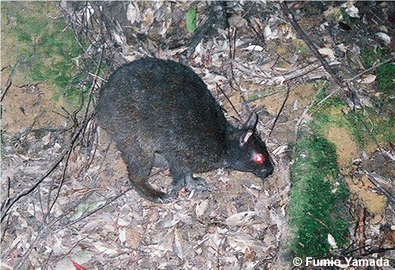Japanese scientists clone embryo of vanishing ‘living fossil’
Jeremy Hance, mongabay.com
November 28, 2008
|
|
With less than 5,000 Amami rabbits left in Japan, scientists have implanted a cloned embryo of the species into a common rabbit according to a recent entry in the EDGE blog. The scientists hope that the Amami will come to full-term, but warned that the possibility of pregnancy was only 10 percent—not uncommon with other cloned animals.
The embryo was created by extracting a cell from the ear of a dead Amami rabbit and placing this into the egg of the common rabbit.
“After we confirmed that the egg developed into a cloned embryo, we put it back into the fallopian tube of the host mother,” Professor Yoshihiko Hosoi told the AFP. “In about 30 days the host mother may give birth to a baby rabbit which has the gene information of Amami rabbit.”
The species is being cloned to add a great buffer against inbreeding. “If we can use the gene information of a dead body, it will help avoid inbreeding which could lead to a genetic abnormality or frail offspring,” Hosi explained.
 Endemic to Amami and Tokuno islands, the Amami rabbit is listed as endangered by the IUCN redlist. Photo by Fumio Yamada |
The Amami is ranked as number 43 in the EDGE program’s list of the hundred most unique and endangered mammals worldwide. The species has been referred to as a ‘living fossil’ due to the fact that it is similar to fossils found in the Miocene, and remains one of the most primitive rabbits in the world.
Protected by Japanese law since 1921, the Amami still faces many threats. Surviving on two islands, the Amami has lost much of its habitat due to logging. In addition it has faced threats from introduced dogs, cats, and, most seriously, the Javan Mongoose. Introduced to the islands in the late 1970’s by humans to curb the habu pit viper population, the mongoose, however, focused its famed predatory skills on the Amami instead.
If the procedure proves successful this would be Japan’s first cloned animal, and one of few cloned wild species in the world.